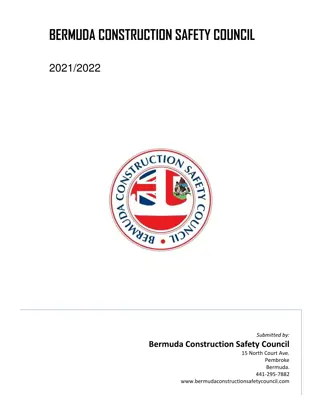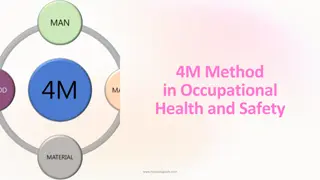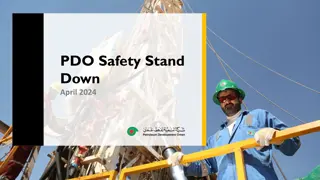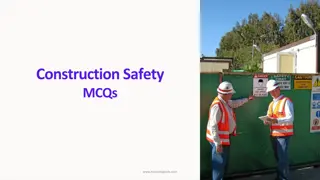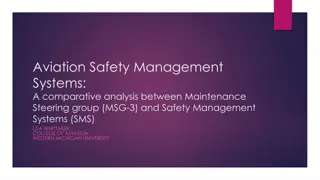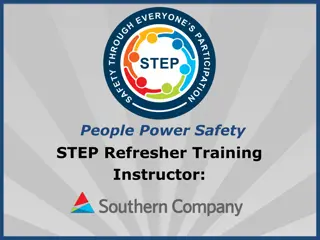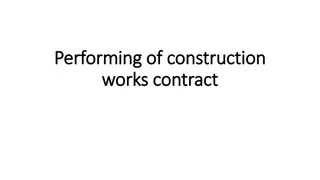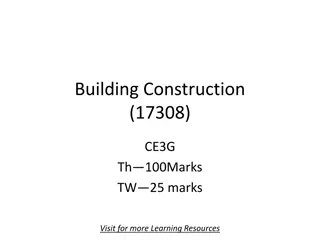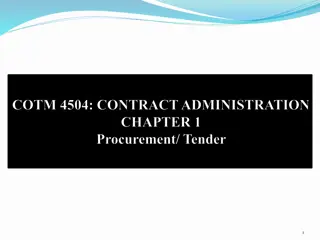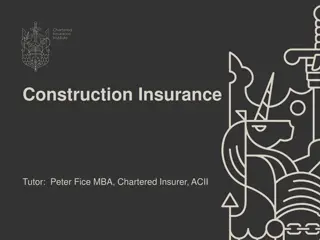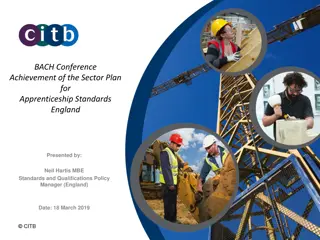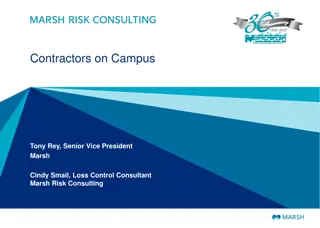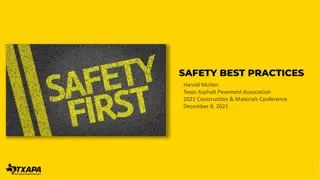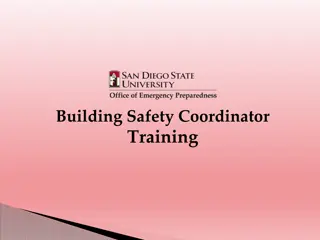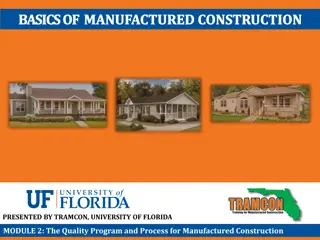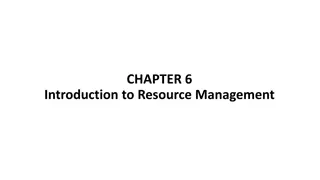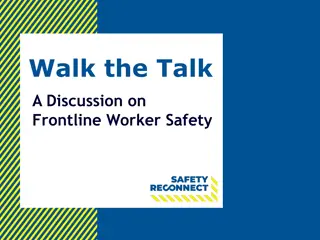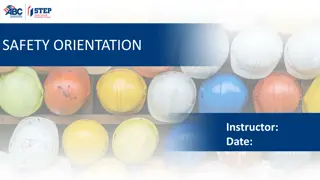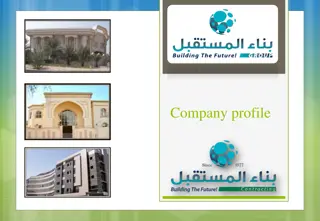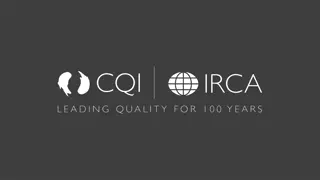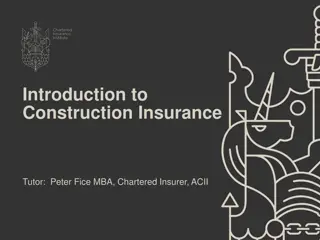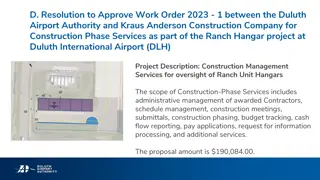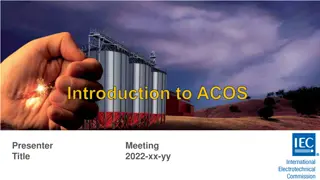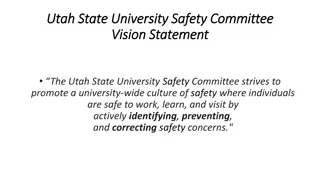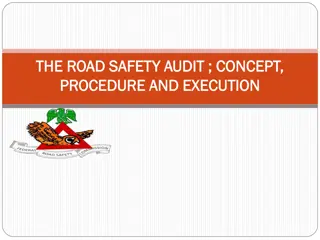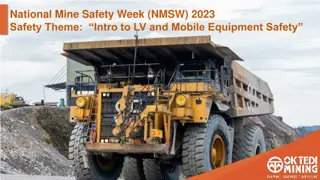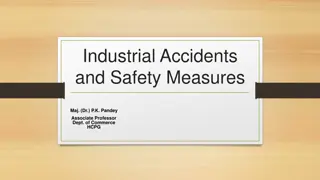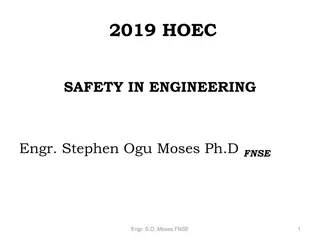Importance of Safety in Construction Business
Ensuring safety in construction projects is crucial for success. Safety measures should be integrated from the design phase to project completion. Key principles include having a dedicated safety department, considering safety records, allocating funds for safety management, providing safety education and training, and prioritizing safety at all stages of a project. Accidents can result from various factors like planning deficiencies, execution issues, inadequate equipment, poor management, and unsafe worker behavior, leading to negative effects such as structural failures, falls, fires, and other mishaps.
Download Presentation

Please find below an Image/Link to download the presentation.
The content on the website is provided AS IS for your information and personal use only. It may not be sold, licensed, or shared on other websites without obtaining consent from the author. Download presentation by click this link. If you encounter any issues during the download, it is possible that the publisher has removed the file from their server.
E N D
Presentation Transcript
PRINCIPLES OF SAFETY Constructing safe structures and providing safe working environment is a factor in successful construction business. Concern of safety starts from design stage and continues till the facility is delivered to the owner
GENERAL PRINCIPLES OF SAFETY IN CONSTRUCTION Every large volume of construction project should have a safety department headed by a safety officer Safety measures may be in cooperated as a clause in contract document Previous safety record of a contractor is an important consideration in the pre qualification of contractor Safety is a cost item developed without providing funds 0.2% of estimated cost of construction project is used for safety management Safety education and training is the most important aspect of construction industry Government needs to improve safety inspection and data collection Contractor and trade unions in construction shall extend their concern to safety Safety measures should start at planning and design stage itself.
Causes,effects and prevention of accidents Causes of accidents 1. Planning ,organisation Defects in technical planning Fixing unsuitable time limits Assignment of work to incompetent contractors Insufficient of defective supervision of the work Lack of cooperation between different trades
2. Execution of works Constructional defects Use of unsuitable materials Defective processing of materials 3. Equipment Lack of equipment Unsuitable equipment Defects in equipment Lack of safety devices or measures
4. Management and conduct of work Inadequate preperation of work Inadequate examination of equipment Imprecise or inadequate instructions from supervisor Unskilled or untrained operatives Inadequate supervision 5.Workers behavior Irresponsible acts Unauthorised acts Carelessness
Effects of accidents Construction includes large number of methods- demolition,earthwork,digging shafts or tunnels,concreting,structural steel erections,drilling,piling,weldings and electrical fittings All methods are hazardous and performed under normal working conditions by unskilled workers Falls from scaffolds,ladders,roof and other heights ,failure of structure due to collapse,damage due to fire,other mishaps results in safety failures
PREVENTION OF ACCIDENTS First step in any accident prevention is to collect useful information about the accidents which have taken place in the organization Evolve a proper accident monitoring system Design of a system has proper orientation or prevention Machinery or equipment must kept in safe condition Slippery floors and dangerous stacking should be taken care of Training should be given in safe operations of machines and handling of equipments to all new entrants Arise safety consciousness among the employees
Safety practices in construction industry Safety education and training of construction managers,engineers, supervisors, and workers should be done Safety audit of plant machinery,tools and instruments is to be institutionalized Flammable chemicals,corrosive liquids,harmful solvents need special precuations in storage and handling
Site engineers /Supervisors role in safety He must ensure safe working environment He must regularly inspect and take up maintainance of all machinery, tools and equipment used in the works He must provide efficient first aid to injured persons Site engineer should maintain suitable rescue equipment He must clean all construction areas and storage yards He must give training to workers and employees about precuations with respect to fire prevention,protection and fire fighting He must provide personal protective equipment He must inculcate safety first concept in all who concerened with construction Supervisor/site engineers need to have competency to set up safety systems at work
Safety through legislation Safety in construction is being taken care by bye-laws formed by municipalities within municipal limits, and provisions in contracts of Public Works Department, Military Engineering Service, State government, Port authorities etc Large construction firms departmentally enforce safe work practices A set of comprehensive regulations covering health,safety and welfare of workers employed in works of engineering construction by Director General,Factory advisory service,and Labour institutes,Government of India Central and Power commission also filed a safety manual for project authorities Central Public Works department also have their own safety code on the lines of ILO code Occupational safety and health legislation aims to protect workers,from hazards which endanger their health or safety at work place and to provide compensations
Precautions during handling of materials Precautions during handling of materials Manuals or training programs to guide persons in safe use of new materials. All materials in bags, containers or bundles stored in tiers should be stacked, blocked, interlocked,is stable and secured against collapse. Inflammable liquids and grease should be stored in no smoking area and properly separated from other stored materials. Flammable liquids and lubricants should be handled and transported in safety containers and drums tightly capped. Persons working in hoppers or high piles of loose materials should be equipped with life line and safety belts.
Petrol or other flammable liquids with flash point below 1000 F should not be used for cleaning purpose. At every work site first aid shall be issued to injured persons under guidance of medical officer. Persons handling corrosive materials, adequate equipment should be provided. Adequate ventilations shall be provided by suitable respirators to prevent inhalation of dust and fumes injurious to employees. Workers working on asphaltic materials and stone breakers should be provided with protective foot wear. Suitable face mask should be supplied for workers when lead paints are applied in form of spray.
OCCUPATIONAL HAZARDS Accidents may results in temporary or permanent or may be fatal. Damage to eyes by welding operation by the use of laser, dust from power tool operations etc. Ears may affected if exposed to high level of noise from heavy construction equipments. Heavy machine operators who experience body vibrations are prone to high heart disease. Number of men getting trapped and injured by certain types of machine . For eg. Gear wheels, moving parts of engine, revolving shafts, chain etc.
SAFETY IN CONSTRUCTION INDUSTRY Every employee should be trained to safety by contractor. No employee should be given new assignment without proper explanation of hazards with his fellow employees. Adequate fire fighting equipments should be provided at crucial locations. Employees under influence of intoxicating beverage should not be permitted. Sufficient first aid shall be arranged to the injured under medical officer. Employees working around moving machinery should not be permitted to wear loose garments. Employees must use standard protection equipment for each job. All materials in bags, containers or bundles stored in tries should be stacked, blocked and interlocked and limited in height so that it is stable and secure against sliding or collapse.
Adequate ventilation should be provided at working place. No person should be allowed to enter the wearing space if there is poisonous atmosphere without wearing suitable breathing apparatus and equipping with a life line. To prevent drowning on sites adjacent to water suitable rescue equipment should be provided. Workers employed on mixing asphaltic materials and stone breakers should be provided with protective foot wear. Lead compounds should not be used in the form of spray in interior painting.
ENTREPRENEUR Entrepreneur is one who innovates and promotes a new venture rise to the occasion and assembles the other factors of production and sets the business going.
ENTREPRENEURSHIP It is a purposeful activity in initiating, promoting and maintaining economic activities for the production and distribution of weath. It involves the capacity to bear risk, to forecast prospects of an enterprise confidence of competence to meet unforeseen and adverse situations.
ENTREPRENEUR CONCEPTS Organizing, managing and assuming the risk of an enterprise. Having complete picture of enterprise, taking bold steps to establish an enterprise, coordinating various factors of production. Ability to evaluate business opportunities, gathering required resources, initiating appropriate timely action to achieve success. Ability to innovate and becomes the major factor of production. Decision regarding what, how, where, whom to produce. Mobilizing other factors of production like land, labour, capital, organization and finally initiating production process.
ROLE OF AN ENTREPRENEUR An innovator introducing something new into the economy. A person who finds a method of production not yet tested by experience in the branch of manufacture. A producer who produces a product with which consumers are not familiar. A dynamic person who selects new source of raw material, new market not yet unexploited.
EXPECTATION OF AN ENTREPRENEUR He should undertake the venture with the spirit of service to society and not for profits. Should correctly assess the actual need of society for products or services he wants to provide. He should work hard to improve economic efficiency through better management of resources, finance and reducing overhead cost. Suitable support to large scale industries and results in reduction of cost of certain products. He should help human capital formation by producing men who thinks in terms of investing capital for productive activities. He should be successful example for self employment to entrepreneurship.
He should plan and promote more labour intensive activities to reduce the problem of unemployment. He should face challenges from his competitors and fully dedicate his services for the growth of enterprises. He should be totally involved and committed to the venture he has taken and must be a prime source of innovation and creativity. He should have thorough and operating knowledge of business. He should have greater integrity and reliability to raise conventional investment money.
ENTREPRENEURSHIP IN CONSTRUCTION RELATED ENTREPRENEURSHIP IN CONSTRUCTION RELATED ACTIVITIES ACTIVITIES Consultancy services in structural design, interior design, landscaping etc. Contract services in construction of buildings, public works etc. Manufacturing building materials like building blocks, windows and doors with light weight materials. Testing of building materials. Structural safety services using non destructive test equipment. Surveying works like preparation of layout, alignment of highways etc. Technical valuation of properties. Establish training institutes for training skilled labour in form work, bar bending etc. Establish training institutes for training in computer aided design and drafting software.
ENTREPRENEURIAL STYLE Vs MANAGERIAL STYLE ENTREPRENEURIAL STYLE Starts an industry without any experience. Over self confidence. Utilises resources rationally and economically. Skills are more organizational. Needs training to know various details like raw materials, equipment, market condition, sales, govt. assistance etc. Adopts new techniques and produces new commodities. Has to sharpen managerial capabilities like basic management tools, finance and accounting. Has to refine psychological characteristics in an individual. Has fairly strong ambition. MANAGERIAL STYLE Takes up task after an industry is launched. Experience makes balanced attitudes. Conventional methods are followed. Systematic and are subjected to rather scientific individual experience and capacity. May not be necessary in all cases. Sticks to conventional method and cannot change production abruptly. This may not arise. Sufficiently experienced. Normal.
ENTREPRENEURIAL STYLE Vs MANAGERIAL STYLE ENTREPRENEURIAL STYLE Takes certain amount of risk. Being an innovator introduce something new to economy. Searches for a new market hither to unexploited. There is a complete union of ownership and control. Need not consult anybody while taking decision. MANAGERIAL STYLE Generally avoids any kind of risk. Follows systematic and conventional ways. Thinks of existing conditions. Deals in organisational aspects. Helps to promote co-ordination. Has to consult before executing and implementing any decision.
TECHNOCRATS Technocrats are specialist in engineering subsystems dealing with mechanical, production engineering, civil and structural engineering, metallurgy,electrical and electronics engineering ,chemical engineering etc It is conversant with application of scientific methods in using resources
CHARACHTERISTICS OF TECHNOCRATS Conversant with logical thinking and can deduce results from assorted data Know to test the validity of data and quantify them More interested in mechanisms than meanings, processes than purposes Emphasis on quantifiable performances, optimum use of resources, than manpower and money Asset in systematic thinking aids decision making in optimum use of resources and complex planning Understand and manage financial problems, through formal education system Weakness lies in handling of human, financial and market problems
MANAGERS Management is a function or process necessary for organization may be business or non-business The responsible individual is a manager who exercises leadership by assuming authority, accepting responsibility, delegating power to act, establishing accountability by individuals Management organizes, directs, and controls various activities of enterprise towards specific objectives by use of resources Management combines all duties and functions for initiation of an enterprise, financing, establishment of all policies, provision of necessary equipment
Management coordinates and gets things done through others Management has scientific basis,management techniques are to measurement and factual determination Management actively directs human efforts towards common goal
FUNCTIONS OF MANAGEMENT Determine and lay down objectives and maintain them, objectives should be clear, definite and realistic Putting together bits of information gathered from different sources to get a picture of situation, Planning involves analysis of a problem, thinking out forward solution to that problem, outlining the steps to reach objectives Organizing creation of a structure of functions and duties by a group of people for attainment of objectives, and goals of enterprise Staffing defines requirements regarding people for job to be done, selecting suitable persons for positions, training subordinates to fulfill the tasks
Coordinating is the essence of management with high productivity depends on interest and willing cooperation of management and workers Directing directing, guiding,or counselling combines activities related to guiding, advising and supervising subordinates Motivation-it is necessary to make the employees to work harmoniously to attain goals Controlling-call attention to deviations of performance from plans point out trouble spots, and corrective action is taken, leads to finding of difficulties, overcoming difficulties, adjusting operations Promoting Innovation:-permanent success promotion of innovation is needed, innovation is introduction of new philosophy, idea, policy or procedure
Factors that make a successful entrepreneur Strong desire for independence and ability to stand alone Drive and energy in organizing ability A desire to diversify, expand and innovative Technical and managerial knowledge Above average intelligence Capacity to take risk Self confidence and long term involvement Persistent problem solving and goal setting Tolerance of ambiguity and uncertainty
Factors that make a successful contractor Confidence,independence,individuality optimism Thorough knowledge of various civil engineering works,ability to list the work into constructional activities,assessing their sequence and interdependence Ability to organize,schedule and execute the activities Good foresight in arranging resources like men,money,materials, machines and skilled management techniques Need for achievement,profit oriented persistence,perseverance, determination,hardwork Leadership qualities to get along with others ,responsive to suggestions and crticism
Requirements of an enterpreneur Accuracy it depends on accurate thinking Time sense and foresight-always think in terms of time,able to forecast with foresight,look into future Alertness-keep in touch with the world,up and doing to satisfy wants,create fresh wants Honesty-entrepreneur must be honest,use all ability to provide precisely he wants Ability to cooperate-cooperate with large number of others, able to compromise, adjust, adapt, willing to admit his judgement may be wrong Consistency and dependability-must be consistent to exercise firmness in dealings with others and able to satisfy co-workers loyal to him
Energy-a reasonable physical and nervous energy ,processes forcefulness to put across his ideas and suggestions belives to be right Personal qualities- better than average intelligence, constructive imagination ,knowledge of human nature, enthusiasm, sense of humour self confidence self control pleasing personality concentration, tolerance
ENTERPRENEUR MOTIVATION ADVANTAGES Higher industrial mobility and full utilization of resources Production and employment at low cost Exploitation of short run oppurtunities, economic scale, locational advantages, ancillary activities Decentralized growth and deployment of purchasing power. Extension of opportunities for innovative talents and techno managerial skills. Intimate personal contacts and better industrial relations. Reduction of monopoly and skilled work force.
ENTERPRENEUR MOTIVATION DISADVANTAGES Lack of finance for initial investment. Lack of requisite managerial skills. Limited resources low production. Poor organization. Lack of technical know how. Ignorance of market condition. Lack of quality control and research facilities. Inefficient methods of production.
PROFILE AND REQUIREMENTS OF ENTERPRENEUR Accuracy Accurate thinking. Time sense and foresight Requirements should be thinked in terms of time, he must be able to forecast and foresight and look into future. Alertness He must keep in touch with the world, he must be up and doing to satisfy wants and also create fresh wants. Honesty. Ability to co-operate. Consistency and dependability Consistent mind will be able to exercise firmness in his dealings and dependable entrepreneur satisfies his co- workers.
Energy Reasonable physical and nervous energy is required and he should put across his ideas and suggestions which he believes to be right. Personal qualities Average intelligence, constructive imagination, knowledge of human nature, enthusiasm, sense of humor, self- confidence, self-control, pleasing personality, concentration, tolerance.
SMALL SCALE INDUSTRY Small scale industry sector to make and ever growing contribution to national economy like production, distribution, development of exports, expansion in employment opportunities, import situations etc. Factors responsible for growth of small scale industries Considerable cost advantage is achieved. Reserved product lines for small scale industries, a policy taken by govt. Study of economic viability and optimum utilization of capital resources. Availability of larger credit from nationalised banks. Procurement of imported and scarce raw materials along with existing facilities.
SMALL SCALE INDUSTRY ROLE IN ECONOMIC DEVELOPMENT Small scale industries is important towards poverty eradication, employment generation, rural development and creating regional balance in promotion. Employment generation provides huge number of employment opportunities. Mobilisation of resources and entrepreneur skills mobilise a good amount of savings and entrepreneur skill, improves social welfare of a country. Equitable distribution of income stimulate redistribution of wealth income and political power within societies.
Regional dispersal of industries Utilises local resources and brings dispersion of industries in various parts of country, promotes balanced regional development. Provides opportunities for development of technology. Indigenisation Makes use of indigenious organizational and management capabilities by drawing entrepreneurial talent and testing round for new venture. Promotes exports. Supports the growth of large industries by providing components, accessories, semi finished goods. Better industrial relations.
REQUIREMENTS TO BECOME A LICENSED SURVEYOR Any construction, residential, industrial, shopping center, recreation places, restaurants in a town or a city shall be approved by municipalities or corporations. Such proposals are submitted in form of drawings like site plan, proposed building, adjacent property boundaries, existing roads. These drawings showing plans, section, elevation are certified by registered licensed building surveyor. He should be thorough with town planning rules during the time of submission of drawings. The number of licensed building surveyors shall depend upon nature of town or city, growth of town and determined by council.
The minimum qualification for a registered building surveyor shall be Diploma in Civil Engineering or Degree in Civil Engineering or corporate membership (Civil) of Institution of Engineers (India). He shall submit application form with proof of qualification to municipal authorities and the registration fees according to rule. The council shall verify requirements and approve registrations. The council also conducts interviews and has got legal right to cancel license of surveyor.
REQUIREMENTS TO BECOME A LICENSED CONTRACTOR Contractor may be an individual or a group of person registered as a firm. They should form a company and shall submit technical and financial viabilities and experiences in construction field. Depending upon financial abilities engineering department will register under different classes. ie; A class contractor, B class contractor. Before submitting a tender registered contractor should submit a clearance certificate from income tax department. After categorizing contactors, registration fee is paid to engineering department. This enables contractor to enter into a contract agreement if tender is accepted by an engineer.
Requirements of small scale buisness License:- government issued permission to engage in an activity or to operate a business Criteria for small scale industry in India Industry employing less than 100 workers Having fixed assets of less than 10lakh need not obtain any license Confirm rules and regulations by state or local authority under factories act
Agencies promoting small scale industry State financial corporations-grants loans for purchase of land,construction of factory,machine purchase and equipment. State directorates of industries-extend assistance between Rs 10000/-and Rs 50000/- for construction of factory,purchase of machine,loans are repayable Commercial banks-provide short term and medium term financial assistance. Industrial Development Bank of India-offers Bills rediscounting scheme Refinance scheme National Bank of Agricultural and Rural Development
QUALITY MANAGEMENT Quality management is the act of overseeing all activities and tasks that must be accomplished to maintain a desired level of excellence. This includes the determination of a quality policy, creating and implementing quality planning assurance, and quality control and quality improvement
Elements of quality Leadership Training Incentives Management Myths Traps Tricks
ISO 9000 Quality is a product or service refers to totality of features and characteristics to satisfy customers needs ISO 9000 series of quality systems use these standards as effective tool for business sucess



